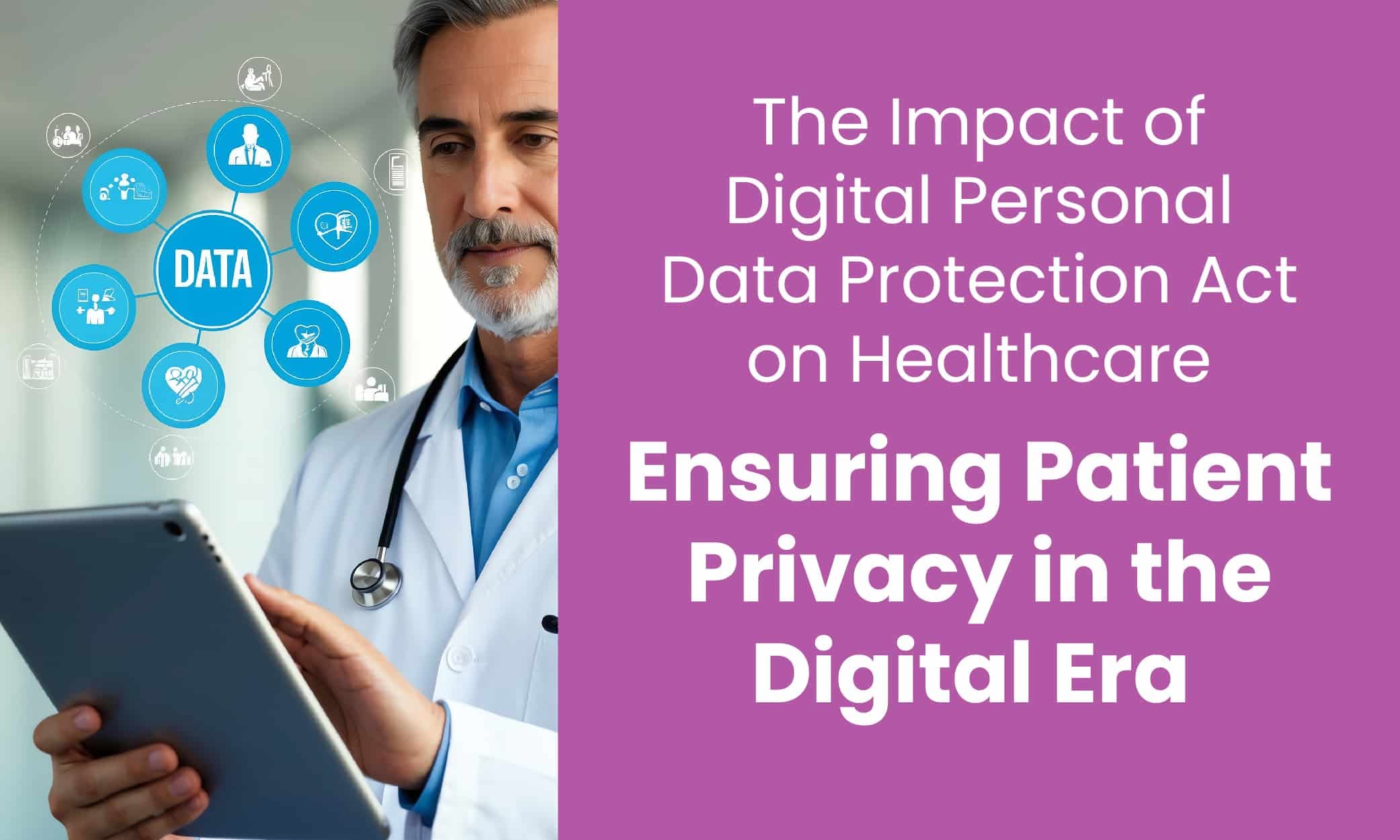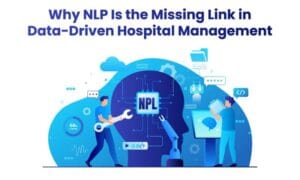
The Digital Personal Data Protection Act, of 2023, is a major step towards securing personal data in India, especially in healthcare where sensitive information is routinely collected and processed. As digital healthcare solutions like telemedicine, EHRs, and AI diagnostics grow in popularity, this Act ensures patient privacy and responsible data handling. We’ll now delve deeper into how this Act shapes the healthcare industry.
The Digital Personal Data Protection Act, of 2023, brings significant implications for healthcare providers in India. Key takeaways include stringent data privacy and security obligations, informed consent requirements, and data breach notification protocols. Healthcare organizations must implement robust data protection measures, conduct regular data audits, and appoint a Data Protection Officer (DPO). Adherence to these regulations is crucial to safeguard patient data and avoid penalties.
Key Takeaways for Healthcare Providers under the Digital Personal Data Protection Act, 2023
- Healthcare providers are designated as Data Fiduciaries, responsible for securely and lawfully processing patient data.
- Explicit, informed patient consent is required for data collection and processing, with easy options for withdrawal.
- Robust data security measures, such as encryption and restricted access, must be in place to avoid hefty penalties.
- Special provisions exist for processing health data during emergencies without prior consent.
- Additional safeguards apply to children’s data, including parental consent and restrictions on behavioural monitoring.
- Data retention must be limited to the necessary duration, with strict guidelines for data deletion or anonymization.
- Cross-border data transfers are regulated, ensuring patient data remains protected when stored or processed abroad.
1. Healthcare Providers as Data Fiduciaries
The Digital Personal Data Protection Act identifies healthcare organizations such as hospitals, clinics, telemedicine providers, and diagnostic centres as Data Fiduciaries. This means that they are responsible for determining the purpose and method of processing a patient’s data. The Act imposes specific obligations on these entities, requiring them to process patient data securely and lawfully.
For example, a hospital that collects patient information for admissions or diagnostics must ensure that they processes data only for its intended purposes, like patient care, and protects it from breaches.
Furthermore, the healthcare ecosystem often involves third-party service providers—such as diagnostic labs, pharmacy services, or cloud-based health record storage—who will act as Data Processors. These processors handle the data on behalf of the fiduciaries, and they too must adhere to the Act’s stringent requirements. This means healthcare providers need to ensure that any external parties involved in handling patient data comply with the Act through contracts and compliance mechanisms.
2. Consent: The Foundation of Data Processing
One of the pillars of the Digital Personal Data Protection Act is the focus on patient consent. Healthcare providers must obtain explicit, informed, and unambiguous consent from patients before processing their personal data. For example, suppose a telemedicine app collects personal health details. In that case, the app must provide clear reasons for data collection, where they are using that data, and sharing of the data with third parties.
Patients must be informed in simple language about what they are agreeing to, and the consent must be specific to the purpose for which data is collected. For instance, if a hospital uses a mobile app for appointment booking and health record storage, they cannot automatically access the patient’s phone contact list without a valid reason linked to the healthcare service. If the consent request includes unnecessary data access, that portion will be deemed invalid.
Moreover, patients have the right to withdraw their consent at any time, and healthcare providers must make this process as simple as giving consent. However, healthcare providers can continue processing certain data if necessary for legal obligations or ongoing medical services.
3. Data Security Obligations
Given the sensitive nature of health data, the Act requires healthcare providers to implement robust security safeguards to prevent unauthorized access, breaches, or misuse. This includes secure storage, encryption, and restricted access to medical records. Hospitals and telemedicine services must employ adequate measures such as multi-factor authentication, encryption protocols, and role-based access control to protect patient data.
A breach of personal data can result in significant fines under the Act. For example, if a hospital suffers a data breach where unauthorized parties gain access to patient health records, the healthcare provider could face a penalty of up to ₹250 crore, depending on the severity of the breach. Healthcare institutions are also required to report data breaches to both the Data Protection Board of India and the affected individuals within a reasonable time, ensuring transparency and prompt action.
4. Handling Sensitive Health Data During Emergencies
The Act makes provisions for situations where processing personal health data is necessary without prior consent. For instance, in medical emergencies, healthcare providers may process personal data to save lives or provide urgent treatment. This ensures that healthcare services are not delayed by bureaucratic processes during critical situations, such as providing medical assistance during a natural disaster or a pandemic.
Moreover, during public health emergencies such as pandemics or disease outbreaks, healthcare providers may need to process personal data to provide mass health interventions. For example, in the case of a viral outbreak, data might be shared with government bodies for tracking infection rates or distributing vaccines, even without the usual explicit consent.
5. Protection of Children’s Data
The Act places additional safeguards on the processing of personal data related to children (individuals under 18 years). Healthcare providers must obtain verifiable parental consent before processing children’s personal data. This rule applies especially to paediatric clinics, hospitals, and healthcare apps targeting children’s health.
Moreover, the Act prohibits any form of behavioural monitoring or targeted advertising directed at children based on their healthcare data. For example, if a child uses a telemedicine app for a medical consultation, the app is restricted from using that data for marketing purposes, ensuring that children’s sensitive health information is not exploited.
6. Data Retention and Erasure
Healthcare providers must retain personal data only as long as necessary for the specific purpose of collection. After treatment or purpose completion, data should be deleted or anonymized, unless legal requirements dictate otherwise. Medical records, for example, might need to be retained for regulatory compliance or legal reasons. However, once the retention period ends or patient consent is withdrawn, data must be erased to avoid penalties.
7. Cross-border Data Transfers
With the rise of telemedicine and cloud storage solutions, many healthcare providers store patient data in international servers. However, the Act regulates the transfer of personal data outside India. If a healthcare provider wants to transfer patient data to a cloud service or a diagnostic lab abroad, they must ensure that the recipient country provides adequate data protection, as stipulated by the Indian government.
Healthcare providers offering telemedicine or treatment to international patients must be especially cautious about cross-border data transfers. Non-compliance could result in severe penalties and reputational damage.
Conclusion: Ezovion HMS—Ensuring Trust and Compliance in Healthcare
The Digital Personal Data Protection Act, 2023 sets stringent standards for handling patient data, emphasizing consent, security, and transparency. For healthcare providers, compliance with the Act is crucial to safeguarding patient trust. And it avoids penalties in an increasingly digital environment. Nowadays digital healthcare solutions like telemedicine and electronic health records are widely spreading. The Digital Personal Data Protection Act will serve as a crucial framework for protecting personal data.
By designating healthcare providers as Data Fiduciaries, the Act ensures that patient data is processed securely, with explicit consent and adherence to legal obligations. It highlights the importance of data security and consent management. It offers special provisions for emergencies and heightened safeguards for children’s data. With significant penalties for non-compliance, healthcare institutions are compelled to adopt robust data protection measures.
Reference–





